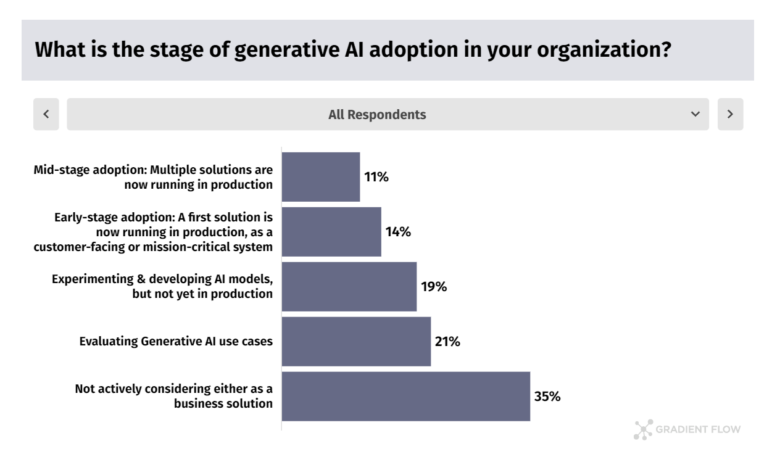Generative AI in Healthcare Survey Reveals Rising Adoption Amidst Challenges –

What You Should Know:
– John Snow Labs, the AI for healthcare company announced the findings of the inaugural Generative AI in Healthcare Survey. Conducted by Gradient Flow, the research explores the trends, tools, and behaviors around generative artificial intelligence (GenAI) use among healthcare and life sciences practitioners.
– Findings reveal a significant increase in GenAI budgets across the board, with one-fifth of all technical leaders witnessing a more than 300% budget growth, reflecting strong advocacy and investment.
Key findings from the survey include:
Growing Adoption and Investment
- The survey reveals a significant increase in GenAI budgets across the board.
- Technical Leaders, who champion GenAI’s potential, are witnessing the highest budget hikes.
- Large companies are most likely to be evaluating use cases, while medium-sized companies are focused on experimenting and developing AI models.
Healthcare-Specific Language Models Take Center Stage
- Survey respondents favor custom-built, task-specific language models designed for healthcare needs.
- Open-source models are also popular due to cost-effectiveness and adaptability.
Broad Applications for LLMs in Healthcare
- Common use cases include answering patient questions, deploying medical chatbots, and information extraction/data abstraction.
- Technical Leaders prioritize information extraction and biomedical research applications.
LLMs: A Transformative Force for Patient Care
- Respondents believe LLMs will significantly impact transcribing doctor-patient conversations, medical chatbots, and answering patient questions.
- Smaller companies have higher expectations for LLMs, potentially due to their agility in adopting new technologies.
Accuracy, Security, and Privacy Remain Top Priorities
- When evaluating LLMs, accuracy, security, and privacy risks are paramount concerns, with cost being less important.
- Technical Leaders place an even greater emphasis on these criteria, demonstrating a deeper understanding of potential risks and benefits.
Challenges and Roadblocks to Adoption
- Lack of accuracy and potential legal/reputational risks are the biggest limitations to GenAI adoption.
- Smaller companies view cost as a more significant roadblock compared to larger companies.
Human Oversight Remains Crucial
- “Human-in-the-loop” is the most common approach for testing and improving LLM models, highlighting the importance of human intervention.
Testing Focuses on Fairness and Transparency
- Fairness, explainability, and private data leakage are the most commonly tested requirements for LLM solutions.
- Technical Leaders prioritize private data leakage and potential for misinformation, reflecting their awareness of technical risks.
Future of GenAI in Healthcare
The survey paints an optimistic picture for the future of GenAI in healthcare, with the potential to transform patient care, streamline workflows, and accelerate research. However, successful implementation will require addressing accuracy, bias, and industry-specific needs. Collaboration between technical experts and healthcare professionals will be critical in navigating these challenges and ensuring ethical development of GenAI solutions.
“Healthcare practitioners are already investing heavily in GenAI, but while budgets may not be a top concern, it’s clear that accuracy, privacy, and healthcare domain expertise are all critical,” said David Talby, CTO, John Snow Labs. “The survey results shine the light on the importance of healthcare-specific, task-specific language models, along with human-in-the-loop workflows as important techniques to enable the accurate, compliant, and responsible use of the technology.”


